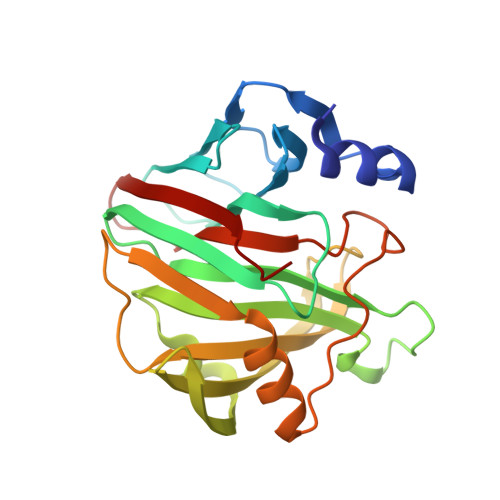Unlocking the structural features for the xylobiohydrolase activity of an unusual GH11 member identified in a compost-derived consortium.
Kadowaki, M.A.S., Briganti, L., Evangelista, D.E., Echevarria-Poza, A., Tryfona, T., Pellegrini, V.O.A., Nakayama, D.G., Dupree, P., Polikarpov, I.(2021) Biotechnol Bioeng 118: 4052-4064
- PubMed: 34232504
- DOI: https://doi.org/10.1002/bit.27880
- Primary Citation of Related Structures:
7L1W, 7L1Y, 7L1Z - PubMed Abstract:
The heteropolysaccharide xylan is a valuable source of sustainable chemicals and materials from renewable biomass sources. A complete hydrolysis of this major hemicellulose component requires a diverse set of enzymes including endo-β-1,4-xylanases, β-xylosidases, acetylxylan esterases, α-l-arabinofuranosidases, and α-glucuronidases. Notably, the most studied xylanases from glycoside hydrolase family 11 (GH11) have exclusively been endo-β-1,4- and β-1,3-xylanases. However, a recent analysis of a metatranscriptome library from a microbial lignocellulose community revealed GH11 enzymes capable of releasing solely xylobiose from xylan. Although initial biochemical studies clearly indicated their xylobiohydrolase mode of action, the structural features that drive this new activity still remained unclear. It was also not clear whether the enzymes acted on the reducing or nonreducing end of the substrate. Here, we solved the crystal structure of MetXyn11 in the apo and xylobiose-bound forms. The structure of MetXyn11 revealed the molecular features that explain the observed pattern on xylooligosaccharides released by this nonreducing end xylobiohydrolase.
- Grupo de Biotecnologia Molecular, Instituto de Física de São Carlos, Universidade de São Paulo, São Carlos, São Paulo, Brazil.
Organizational Affiliation:



















